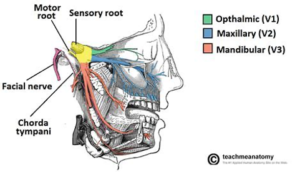TMJ disorders – Osteopathy can help: here’s how
TMJ disorders
According to a survey 68% of us confirmed that our stress levels have continued to increase over the course of 2020.
And it’s no wonder. This year has tested us all.
As a trained Osteopath with more than 20 years experience in the field, I know that stress can manifest itself in the body in many different ways. More recently, I’ve seen a number of clients suffering from a (TMJD).
What is the main cause of TMJ?
TMJD or TMD is not necessarily a well-known term, but it affects around one in 10 people in the UK.
TMJ stands for temporomandibular joint. This joint connects the lower jaw to the skull (or upper jaw) in front of the ear. A TMJ disorder is a condition affecting that joint and the muscles involved in chewing. It can also importantly affect the Trigeminal nerve, which is situated next the TMJ, giving rise to facial symptoms:

It has no definitive cause but can be brought on by over-clenching of the jaw and teeth, wear and tear of the inside jaw, injury or surgery, and stress, all of which has a physiological relationship to the neck and upper back.
According to Bupa, women tend to develop jaw conditions more often than men. It can occur at any age, but most people have them when they’re between 20 and 40.
TMJD symptoms
Symptoms include:
- Jaw pain
- Headaches
- Clicking, popping and grating noises when chewing or opening the mouth
- Earache
- Neck/shoulder pain
- Difficulty chewing
- Locking of the joint
- Facial and eye symptoms (see illustration of Trigeminal nerve distribution above)
It goes without saying that these symptoms can have a significant impact on a person’s lifestyle if left untreated. So, it’s worth seeking medical advice if symptoms are severe or long lasting.
It may be possible to alleviate the symptoms of a TMJD by eating soft foods, avoiding chewing gum and nail biting. The same could be said by completing daily Rocabado exercises, taught by Robin Kiashek, which helps to alleviate TMJ stress.
But Osteopathy can also be effective in easing the pain of TMJD by understanding the factors which may be causing the TMJD. Whether they are physical factors in the patient’s upper back, neck and/or emotional factors. Dental factors should be taken into consideration.
TMJ disorder treatment testimonials
But don’t just take my word for it. I have worked with dentist David Cook, BChD, at the London Holistic Dental Centre for more than a decade. David has referred his clients suffering from TMJ to me to help alleviate the pain.
David says: “I have worked with Robin for over 15 years and his skill and dedication have been demonstrated countless times. I treat a lot of facial pain and TMD and I have found his holistic approach is of enormous benefit to my patients, those that see him can expect a smoother, faster recovery and better long-term stability.
“He is an excellent diagnostician and his knowledge and approachability make him a valued member of my clinical team. As a dentist, I am subject to major spinal strain and can also vouch for Robin’s superb support in keeping my body straight, mobile and pain-free.”
If you’re a sufferer of TMJ, or have been suffering from the symptoms associated with this disorder, please don’t hesitate to get in touch or book an appointment.




